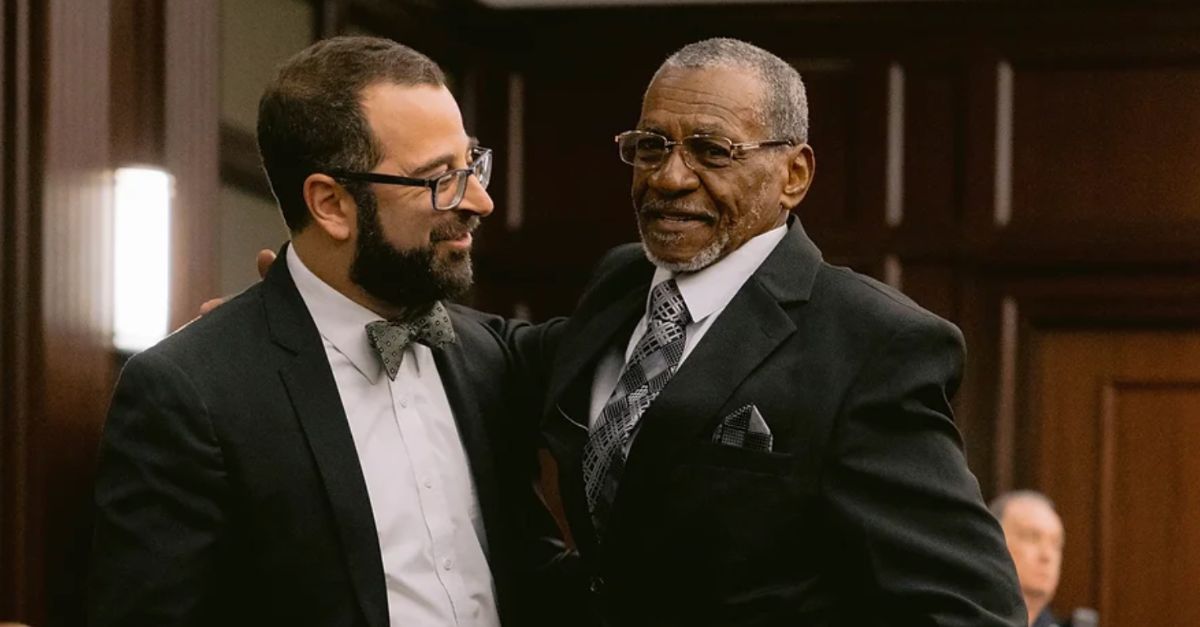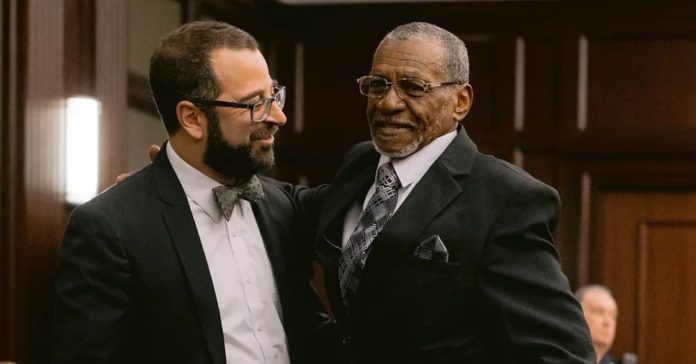
Willie L. Williams Jr., right, had his conviction set aside by a judge in Florida. (Innocence Project of Florida/Saskiya Fagan)
A Florida judge set aside the wrongful conviction of a man who served nearly 45 years in prison for an armed robbery based on shaky evidence that prosecutors failed to disclose — their star witness identified him as the shooter after having had his memory “hypnotically refreshed” by a police lieutenant self-taught in hypnotism.
In a hearing on Wednesday, Fourth Judicial Circuit Judge Lindsay Tygart vacated Willie L. Williams Jr.’s 1976 convictions for attempted murder and robbery. The move came after the Fourth Judicial Circuit State Attorney’s Office’s Conviction Integrity Review (CIR) examined the case and uncovered the exculpatory evidence, his lawyers said in a news release.
“It has been more than 48 years since I was originally arrested for this crime,” said Williams, 79. “I always knew that I was not the shooter, but I didn’t have the evidence to properly defend myself. I am so grateful to the State Attorney’s Office for diligently reviewing my case and discovering the key evidence to show that I was wrongfully convicted. I also want to thank the Innocence Project of Florida for helping me resolve my case. I am so thankful that I can finally put this injustice behind me and move on with my life.”
IPF Legal Director Brandon Scheck applauded the move.
“It is important that when it becomes clear that a conviction was procured through unconstitutional means, that all parts of the system — the State, Defense and Court — move swiftly to right that wrongful conviction,” he said. “We are grateful to the CIR and the senior leadership at the State Attorney’s Office for identifying this critical evidence and quickly concluding that its non-disclosure violated Mr. Williams’ due process rights, making his conviction and almost 45 years in prison wrongful.”
David Chapman, a State Attorney’s Office spokesman, said in an email to Law&Crime that the State concedes the newly discovered evidence entitles Williams to post-conviction relief.
“Years after Williams’ convictions, the Florida Supreme Court ruled that hypnotically refreshed memory was unreliable and consequently inadmissible as evidence of guilt,” the statement said. “As a result, the State will not refile the charges from 1975 against Williams.”
He was convicted on Feb. 16, 1976, on two counts of attempted first-degree murder with possession of a firearm and two counts of robbery with possession of a firearm.
The motion to vacate the judgment and sentence obtained by Law&Crime spells out the details of the long-ago case.
The drama happened at the Wesconnett Produce Store in Jacksonville at 4 p.m. on Oct. 8, 1975. A gunman demanded money from the store’s co-owner — and got $50 — and a customer’s wallet before shooting them both in the head and driving off. Miraculously, they survived.
The store’s co-owner was shot and nearly blacked out from bullets to the head, back, and hand. The customer, David Phillips, later the key witness in the state’s case, was also shot in the back of the head after handing his wallet over. He managed to walk out of the store and sit in the middle of the road until an ambulance arrived. The store’s co-owner survived but couldn’t identify the attacker.
Williams, a passenger in the green Buick that the gunman drove, was arrested after a police chase. The gunman, Alfred Mitchell, killed himself with a .32 caliber lead alloy bullet to the head after running into a house surrounded by officers.
Williams claimed his innocence right away in a written statement to police. He said Mitchell was the driver, and he was the passenger that day.
Williams testified in court that he did not go into the Wesconnett Produce Store on Oct. 8, 1975, nor did he shoot the victims or even know that Mitchell was about to commit a robbery.
He said in the car afterward, when he asked Mitchell to pull over when police were chasing them, Mitchell pulled out a black pistol and told him, “I just killed two people. Don’t you be the third one.”
When Mitchell collided with other cars during the pursuit, Williams got out of the car and ran when Mitchell shot at Williams but missed. Williams did not get far. Police quickly arrested him.
“The State’s theory was that Willie Williams was the shooter and driver, while the defense’s theory was that Alfred Mitchell was the shooter and driver,” court documents said.
In court, Phillips identified Williams as the man who accosted and shot him.
The defense argued that Phillips misidentified Williams, that his testimony was “based on human error” — and that Williams was not involved in the shootings or robberies. The defense argued the evidence showed the dead man, Mitchell, was the assailant.
But a jury disagreed, finding Williams guilty on Feb. 16, 1976, of two counts of attempted first-degree murder with possession of a firearm and two counts of robbery with possession of a firearm. The following month, he maintained his innocence at his sentencing but was given life in prison and three 30-year sentences to run concurrently. The Court noted “clear and unequivocal” testimony by Phillips that Williams had robbed and shot him.
His appeal was unsuccessful.
But he didn’t give up, filing motions for post-conviction relief and correcting an illegal sentence. They were all denied.
His request for copies of various documents, including “Video Hypnosis Result(s),” was also denied.
He managed to get DNA tested on his and Mitchell’s clothes, but an analysis of the items didn’t find any blood on them.
Ultimately, Williams was released on parole on June 30, 2020, which was rare for Florida.
The following year, the Conviction Integrity Review Division of the Fourth Judicial Circuit State Attorney’s Office (CIR) took up his case. This yearslong re-examination included testing for DNA and interviewing witnesses.
The CIR learned that a lieutenant with the Jacksonville Sheriff’s Office had placed Phillips under hypnosis before the eyewitness selected Williams out of a photo lineup.
“Phillips told the CIR that his memory ‘blacked out’ after being shot and he could not remember anything about the robbery prior to being hypnotized,” court documents said. “He was not sure if he did not remember anything because of the gun being pointed at him, the head injury he sustained, or both.”
Phillips told integrity investigators that the now-dead lieutenant who took him through the session “self-studied hypnotism” and did not know whether he was certified, court documents said.
“On May 16, 2023, the CIR met with Mr. Williams at the State Attorney’s Office and disclosed to him the information about the State’s use of hypnosis in his case,” court documents said. This constituted the first time that the State disclosed this information to Mr. Williams or his previous counsels.”
Have a tip we should know? [email protected]

